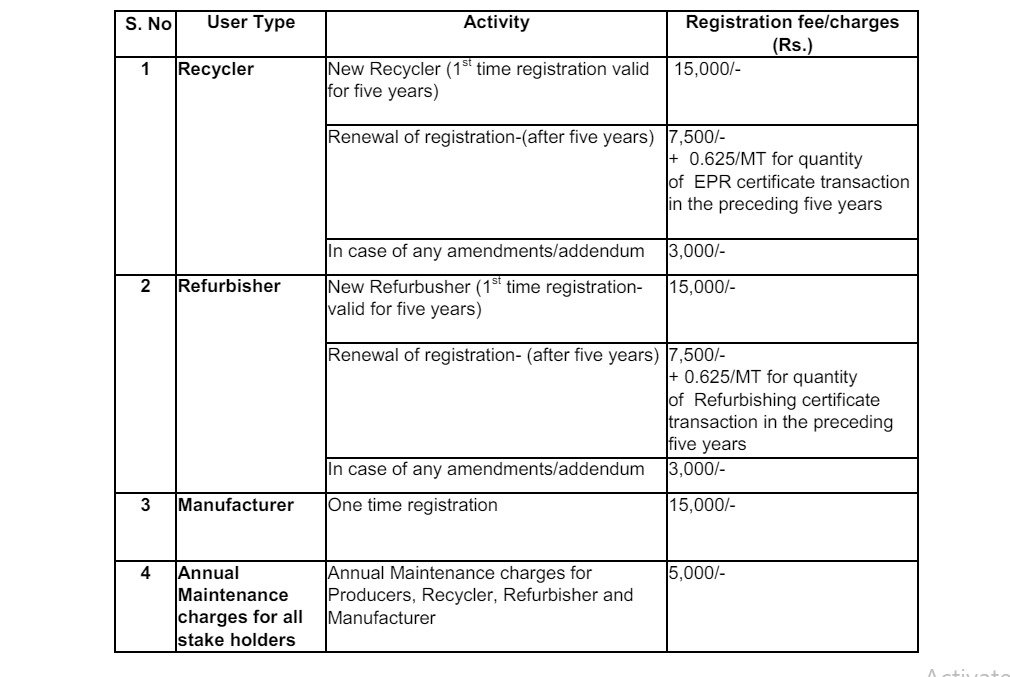EPR-E Waste Authorization for RECYCLING
India’s EPR for E- Waste (2022): Shifting Responsibility, Shaping a Sustainable Future
E-Waste (Management) Rules, 2022
These rules shall apply to every manufacturer, producer refurbisher, dismantler and recycler involved in manufacture, sale, transfer, purchase, refurbishing, dismantling, recycling and processing of e-waste or electrical and electronic equipment listed in Schedule I, including their components, consumables, parts and spares which make the product operational.
The E-Waste (Management) Rules, 2022, implemented in India on April 1, 2023, introduced a revamped Extended Producer Responsibility (EPR) framework for electronic and electrical equipment (EEE) waste management.
Free Consultation By Experts
Introduction
E-Waste Revolution: A Sustainable Future for Electronics (Manufacturers, Recyclers, Refurbishers)
The tide is turning on E-waste! India’s new E-waste (Management) Rules, 2022, present a game-changing opportunity for manufacturers, recyclers, and refurbishers to work together and create a more sustainable, circular economy for electronics.
This isn’t just about the environment (although that’s a big part!). The E-waste revolution offers exciting economic and business benefits for all involved:
- Manufacturers:
- Resource Security: By incorporating recycled materials and designing for disassembly, manufacturers can reduce reliance on virgin resources and potentially cut costs.
- Brand Reputation: Demonstrating environmental responsibility through responsible E-waste management strengthens brand image and attracts eco-conscious consumers.
- Recyclers:
- Growth Opportunities: The increasing volume of E-waste creates a booming market for efficient and responsible recycling practices.
- Innovation Spark: EPR (Extended Producer Responsibility) incentivizes investment in advanced recycling technologies, creating new jobs and boosting the green economy.
- Refurbishers:
- Extended Product Lifespan: Refurbishing extends the life cycle of electronics, offering consumers high-quality products at competitive prices while reducing demand for new devices.
- Market Expansion: Growing consumer preference for sustainable choices creates a ripe market for refurbished electronics.
Environmental Sustainability at the Core:
The heart of the E-waste revolution lies in environmental sustainability. By working within the E-waste framework, manufacturers, recyclers, and refurbishers can:
- Minimize Landfill Waste: Responsible E-waste management diverts electronics from landfills, preventing harmful materials from polluting our environment.
- Conserve Resources: Recycling recovers valuable materials like precious metals and rare earth elements, reducing reliance on virgin resource extraction.
- Promote a Circular Economy: The E-waste revolution fosters a circular economy where electronics don’t become waste, but valuable resources for future generations.
This is a call to action for all stakeholders in the electronics industry. Embrace the E-waste revolution, explore new opportunities, and join the movement towards a more sustainable future for electronics!
Eligibility Criteria
The E-Waste (Management) Rules, 2022, establish an Extended Producer Responsibility (EPR) framework for electronic and electrical equipment (EEE) waste management in India. Here’s a breakdown of the expected legal eligibility criteria for the key roles:
Producers, Importers, and Brand Owners (PIBOs):
- Production: Manufacturers of EEE in India.
- Import: Businesses importing EEE into India.
- Branding: Companies placing EEE under their brand on the market (even if manufactured by someone else).
Potential Exemptions (Details to be Confirmed):
- Minimal Quantities: PIBOs dealing with very small volumes of EEE might fall below a certain threshold (specifics yet to be finalized by the CPCB).
- Specific Categories: The government might exempt specific EEE categories from EPR requirements (e.g., essential medical equipment packaging).
Recyclers and Refurbishers:
- Registration: Most recyclers and refurbishers are likely to require registration with the Central Pollution Control Board (CPCB) or State Pollution Control Boards (SPCBs). Specific details and registration processes are still under development.
- Environmental Compliance: Facilities must adhere to environmental regulations regarding E-waste processing, including:
- Safe handling and dismantling practices.
- Proper treatment and disposal of hazardous materials.
- Maintaining detailed records of E-waste received and processed.
- Potential for Specialization: The E-waste rules might categorize recyclers based on their capabilities (e.g., dismantling only, full recycling process). Refurbishers might need to demonstrate competence in device testing and repair.
Disclaimer:
The information above is based on current understanding of the E-waste rules. As the program is still evolving, specific details might change. Refer to official CPCB pronouncements for the most accurate information
- Production: Manufacturers of EEE in India.
E Waste Categories & Fees
The details of fees to be paid by Manufacturers, Recyclers, and Refurbishers is as given below:
A. The fee structure for registration of Recycler, Refurbishers & Manufacture and
Annual Maintenance Charges for all stakeholders for registration on EPR Portal under E-Waste (Management) Rules, 2022


Documents Requirement for Registration
The main documents required to obtain EPR Authorisation for E-Waste Management Business are
Before setting a recycling plant you will be required some licenses:
- Company Incorporation
- GST Registration
- Authorization from SPCB
- Registration under PWM (Connect with team for full documentation)
Documents Required for Registration:
- GST Certificate
- Company Incorporation Certificate (for Pvt ltd / public ltd
- Authorized Signatory Aadhaar Card
- Authorized Signatory PAN Card
- Electricity Bill
- Layout Plan
- MOA (for Pvt ltd / public ltd)
- Topo map
- Water Bill
- Rent Agreement/ Property Paper
Documents required for Manufacturing of Plastic Raw Material:
- Aadhaar & PAN Card Authorized Signatory
- GST Certificate
- Valid CTE & CTO
- DIC or DCSSI Certificate
Registration Process In India
Recyclers and Refurbishers:
- Registration Likely: Most recyclers and refurbishers will likely need to register with the CPCB or State Pollution Control Boards (SPCBs). Specific details and registration processes are still under development.
- Potential Variations: The registration process for recyclers and refurbishers might vary depending on factors like:
- Scale of Operation: Large-scale facilities might have more stringent registration requirements compared to smaller operations.
- Type of Activity: The registration process for refurbishers might differ from that of recyclers. Refurbishers might need to demonstrate competence in device testing and repair.
- Scale of Operation: Large-scale facilities might have more stringent registration requirements compared to smaller operations.
Here’s a breakdown of some potential registration steps for recyclers and refurbishers (details not confirmed):
- Online Application: Submit an online application through the CPCB or SPCB website (specific portal details awaited).
- Documentation: Provide necessary documents like:
- Business registration details (PAN card, GST registration).
- Details of your E-waste processing facility (location, capacity, equipment).
- Environmental compliance certifications (may vary depending on specific regulations).
- Site Inspection (Possible): The CPCB or SPCB might conduct a site inspection to verify the information provided in the application.
- Registration Approval: If everything meets the requirements, your registration will be approved. You’ll receive a registration certificate that allows you to operate as a certified E-waste recycler or refurbisher.
Key Points to Remember:
- The registration process for recyclers and refurbishers is still evolving.
- It’s advisable to consult with environmental lawyers or waste management professionals to stay current on regulations and ensure a smooth registration process for your business.
- Early preparation by gathering necessary documents and familiarizing yourself with the E-waste rules will be beneficial when the registration process officially launches.
By working together, manufacturers, recyclers, and refurbishers can create a more sustainable future for E-waste management in India!
Renewal of Registration
E-Waste Registration Renewal in India: A Glimpse into the Future.
The E-Waste (Management) Rules, 2022, are still evolving, and details regarding registration renewal processes for manufacturers, recyclers, and refurbishers haven’t been officially announced by the Central Pollution Control Board (CPCB). However, based on existing practices in environmental regulations and trends in EPR programs globally, here’s a possible scenario for renewal:
Potential Renewal Process:
- Notifications: The CPCB might send email or website notifications to registered entities reminding them of upcoming renewal deadlines.
- Online Renewal Portal: A dedicated online portal for E-waste registrations might facilitate the renewal process.
- Renewal Application: Registered manufacturers, recyclers, and refurbishers would likely submit online renewal applications through the portal.
- Documentation Update: The application might require updating any changes in business details, EEE volumes handled (for manufacturers), or facility information (for recyclers and refurbishers)
. - Renewal Fees (Possible): Renewal fees might be introduced, similar to the potential registration fees.
- Verification and Approval: The CPCB or SPCB might verify the submitted information and approve the renewal application if everything is compliant.
Renewal Frequency (Speculative):
- The renewal frequency for E-waste registrations is not yet confirmed. Globally, EPR program renewals typically range from one to three years.
Here are some additional points to consider:
- Early renewal is recommended to avoid any disruptions in your operations.
- The renewal process might involve compliance checks to ensure adherence to E-waste regulations.
- Consulting with environmental lawyers or waste management professionals can provide specific guidance on renewal requirements for your business.
Remember, this is a speculative scenario based on current trends. The official renewal process will be announced by the CPCB as the program progresses.
Talk To Expert Advisor
STEP - 1
Fill The Application Form
STEP - 2
Get Free Consultation By Experts
STEP - 3
Make Payment & Place the Order
STEP - 4
Executive will process the Application & Get your work done with in the given Timeframe
